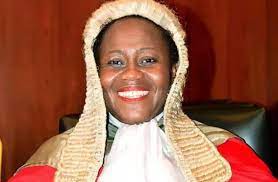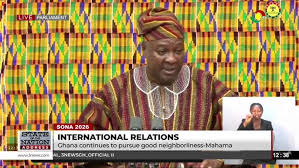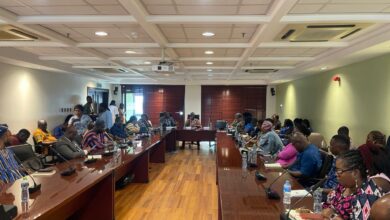Don’t be seen as agents frustrating the will of Ghanaians – Coalition for Proper Human Rights & Family Values admonishes Executive, Judicial branches of Gov’t
Don’t be seen as agents frustrating the will of Ghanaians – Coalition for Proper Human Rights & Family Values admonishes Executive, Judicial branches of Gov’t

The executives and members of the National Coalition for Proper Human Rights and Family Values have admonished the Executive and Judicial branches of Government not to act in a manner that would portray them as agents frustrating the will of Ghanaians.
The group’s admonishing comes in the wake of a deferred ruling on two cases brought before the Supreme Court of Ghana, seeking to restrain Parliament from transmitting the pro-Family Values Bill to the presidency.
On Wednesday 17th July, a five-member panel of the Supreme Court of Ghana chaired by her Ladyship Justice Gertrude Torkornoo deferred ruling on two cases brought to it, seeking to restrain parliament from transmitting the pro-family values bill to the presidency.
The Coalition in a statement expressing its displeasure reminded all and sundry that the Legislative branch of government has exercised an enumerated power to enact laws that capture the ethos and aspirations of the people of Ghana in whose name and for whose welfare the powers they wield must always be exercised.
According to the coalition no group of people, whether within or without, should be seen as frustrating or attempting to frustrate the will of the people of this country. Saying “Ghana has spoken through her representatives in Parliament, the Executive and judicial branches of Government must work together to respect, promote and fulfil the ideals and aspirations of the good people of Ghana, in whom the Sovereignty of Ghana resides”.
Below is the unedited statement by the Coalition
PRESS STATEMENT – JUDICIAL PROCESSES POTENTIAL IMPACT ON THE PRO-FAMILY (ANTI-LGBTQ+) VALUES BILL
6th August 2024
Introduction
On Wednesday 17th July, a five-member panel of the Supreme Court of Ghana chaired by her Ladyship Justice Gertrude Torkornoo deferred ruling on two cases brought to it, seeking to restrain parliament from transmitting the pro-family values bill to the presidency. The panel stated that they would incorporate their ruling on these cases into the final judgment. This ruling effectively prevents Parliament, even if temporarily, from executing its constitutionally mandated responsibility of transferring the bill to the Presidency. The Supreme Court furthermore suggested an early trial, signaling that it would potentially work to hear and rule on the matter promptly. The core subject matter of this press statement is the need for an expeditious hearing in this instance and the ramifications of not working toward a timely ruling.
In general, there is a need to ensure that legal holidays at the Court of Appeal and Supreme Court level do not infringe on citizens’ rights. These holidays should not obstruct the respect, promotion, and fulfilment of our rights to an effective and efficient justice delivery as citizens. Advocates for Christ Ghana, the National Coalition for Proper Human Sexual Rights and Family Values; the traditional rulers, the Muslim ummah in Ghana, and all Christian ecumenical bodies, across the length and breadth of Ghana wish to call on the Chief Justice and the Judicial system of Ghana to pragmatically address this issue in a way that demonstrates commitment to the people of this country, not just for the Pro-Family Values bill, but crucially to provide a more permanent and long-term solution to timely and effective access to justice. As it is, many are concerned that, if hearings are not adequately scheduled, so much time will be lost that ultimately this bill will not be concluded this year, and the time and resources invested in this bill as well as the hopes and aspirations of over ninety (90%) of citizens would have been thwarted and a serious travesty of justice perpetuated
Specific Background
It is important to note that this bill has seen three (3) years of very, very serious work. This has involved many stakeholders, several meetings, travel to other jurisdictions including France and Hungary and the bill received the single highest-ever number of 176 memos provided on any bill that has come before our parliament. The draft PMB once received by Parliament was referred for legal opinion by the Speaker from the legal office of Parliament. This was to ascertain if it met Constitutional requirements. This clearance was provided by the Legal office, and subsequently, the Speaker admitted the Bill and forwarded it to the Constitutional and Parliamentary Affairs Committee, which advertised for public memos, receiving a record number of 176memosTheCommittee proceeded to hold extensive in-person and virtual hearings for all persons/groups who presented memos and that was a very thorough and long process. The eight (8) sponsors also showed evidence of the four (4) general public consultations that had been held and, in addition, ensured that the required fiscal impact analysis was done and submitted.
As part of this process, the Constitutional and Parliamentary Affairs Committee intentionally created platforms to engage with several pro-LGBTQ groups and heard their testimony in camera. Beyond this, the Attorney-General of Ghana was invited to make inputs in September 2022. This request was effectively honoured after a year, in October 2023, when the AG appeared in person to make submissions and to address the Committee on issues he raised, and these issues were taken on board and addressed. Parliament then spent another six(6)months working on the second consideration stage, where over one hundred(100)amendments were filed and debated in great detail before the third reading and unanimous passing of the Bill by Parliament on 28th February 2024. Clearly, the Bill before the Supreme Court has gotten to this stage at a very great cost to the peace-loving, culturally proud, and faith-sensitive people of this country, and we, the citizens, expect nothing less than that each branch of government “should do their duty”. Ghanaians are calling on and expect every elected or appointed officer in the Judiciary and the Executive to work diligently and expeditiously in performing their duty so that no suspicions are further fuelled and the peace of the land is maintained. The Case for Courts Sitting During Legal Vacations in Ghana
The current practice in Ghana is that the Judiciary observes an annual legal vacation from the 1st of August to the Second Week of October. During this period, the Supreme Court, the Court of Appeal, and some High Courts suspend their regular activities. However, to make some effort at maintaining the efficiency of the justice system, certain High Courts are designated to remain operational to handle urgent and sensitive cases. For example, in 2023, 12 out of the 42 High Courts within the Law Court Complex in Accra were asked to operate during the legal vacation, which was very good.
The Supreme Court and Court of Appeal, however, do not hear any cases during this period. We (A4CG, NCPHSRGFV, etc.) argue today that this situation needs to be permanently reviewed to enhance access to Justice, which is a fundamental right of citizens. The timelines of access to Justice is a matter of importance for example in sensitive cases that involve urgent matters such as bail applications, injunctions, and human rights issues. Delays in these situations can result in significant harm or injustice. To ensure timeliness and prevent irreparable harm to citizens, the Supreme Court in various jurisdictions continue to extend services, for example, the Supreme Court of India operates vacation benches during its seven-week summer vacation to hear urgent matters, ensuring that timely justice continues to be delivered. Ensuring that the courts remain partially operational during vacations prevents a complete halt in the judicial process and provides continuous access to justice for individuals who require immediate legal intervention.
In general, continuous access to justice safeguards and upholds citizens’ rights preventing an interruption in their enjoyment of rights, but not just, that it also bolsters public confidence through trust and demonstrating reliability, when courts are available and responsive even during vacations. This practice demonstrates the Judiciary commitment to justice and ensures that the public perceives the legal system as reliable and dedicated. It is in this context that the Supreme Court of Singapore maintains public confidence by addressing urgent matters even during vacation periods. Another example is the Courts in the UK, which remain operational for urgent cases during their vacations, thereby upholding human rights without interruption. Just in case you are wondering, it is indeed our argument that the injunction cases before the Supreme Court relating to the Pro-family values bill, also called by some the Anti-LGBTQ bill, are urgent cases to be heard and ruled on if we are not to cause a serious financial loss to the state. Such a delay could also result in a loss of confidence in our governance and, in particular, the judicial system by stakeholders and the overwhelming majority of citizens. This is what might happen if the judiciary does not deal with issues relating to this bill timely and we fail to arrive at affirm conclusion on the bill before the end of 2024.
Clearly, the timely resolution of all disputes is important. For example, resolving commercial disputes is crucial for economic stability and contributes to preventing significant economic disruptions. In Australia, the High Court balances its vacation periods with ongoing judicial activities, ensuring that critical economic disputes are resolved promptly in order to support a stable business environment. The continuity of legal processes ensures consistency in the application of law and prevents backlog accumulation, which can complicate and delay future legal proceedings. Courts in countries like Bangladesh ensure a consistent application of legal principles by hearing oral arguments year-round. We believe that judicial efficiency will be enhanced if Ghana adopts the use of vacation benches to hear urgent matters. This will optimize judicial resources and prevent potentially huge case backlogs. In other jurisdictions, this practice ensures that the judiciary remains efficient and responsive throughout the year, and it reduces the burden on courts post-vacation.
Conclusion:
Ensuring that the Court of Appeal and Supreme Court sit during legal vacations to hear sensitive cases is critical. This will guarantee continuous access to justice, protect human rights, reinforce public confidence, support economic stability, ensure legal consistency, and optimize judicial resources. By addressing urgent matters without interruption, our judiciary will demonstrate to us the citizens of Ghana, that there is a high commitment to timely and effective justice for all. Article 1 (1) of our constitution states that: “The Sovereignty of Ghana resides in the people of Ghana in whose name and for whose welfare the powers of government are to be exercised…”
In this context, it is a good time to remind all and sundry that the Legislative branch of government has exercised an enumerated power to enact laws that capture the ethos and aspirations of the people of Ghana in whose name and for whose welfare the powers they wield must always be exercised. No group of people, whether within or without, should be seen as frustrating or attempting to frustrate the will of the people of this country. Ghana has spoken through her representatives in Parliament, the Executive and Judicial branches of Government must work together to respect, promote, and fulfil the ideals and aspirations of the good people of Ghana, in whom the Sovereignty of Ghana resides. God bless our nation Ghana, God bless you for your attention and God bless us all.
By: Kwadwo BUABENG




